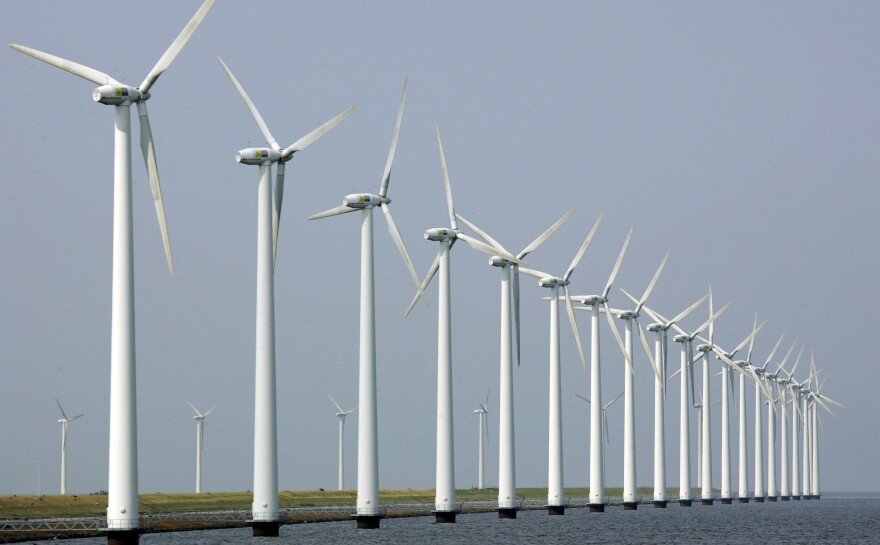The construction and operation of wind turbines offshore will have a “major adverse impact” on the commercial fishing industry. However, the threat of climate change would be worse, according to a federal environmental report released this week on a proposed wind project in waters near eastern Long Island.
The U.S. Bureau of Ocean Energy Management, or BOEM, is the agency responsible for submitting a final environmental impact statement on developers Ørsted and Eversource’s 12-turbine South Fork Wind project that’s planned for 35 miles off of Montauk — as well as all offshore wind in federal waters.
“Some commercial fisheries and fishing operations would experience substantial disruptions indefinitely even if remedial action is taken,” the report said.
If approved, the project will be the second commercial-scale offshore wind project in the United States. Its construction could create up to 1,700 jobs and power 70,000 homes. BOEM expects offshore wind would have low impact on air quality, water quality, tourism and birds and a “moderate impact” on marine life and fish habitats, according to the report.
Ørsted and Eversource said they are moving their way through the permit process.
“South Fork Wind remains on-track to be fully permitted by early 2022, and with construction activities ramping up soon after on this historic New York-first offshore wind farm,” the developers said in a statement.
BOEM still has to ensure the project complies with federal historic preservation and marine fisheries protections law, before approving permits.
The approval process has taken years with community outreach and design benchmarks. Still, Bonnie Brady, the executive director of the Long Island Commercial Fishing Association, said the fishing industry’s concerns are being ignored.
“I just don't understand the same people that say they support us as an industry because we are basically, you know, national food security and providing food for our nation could, in the same breath, just say, 'Oh, sorry’ and just basically cast us aside,” she said.
The report said construction of the project will require construction ships and barges to enter historic fishing grounds, leading to congestion, difficulties with navigating, and an increased risk for collisions, leading to fishermen having to use alternative ports or change routes. The increase in traffic will likely not be permanent, the report said, as future offshore wind projects are set to result in a small traffic increase of around 380 ships over a 10-year period.
Fishing groups are concerned about safe navigation with up to 800-foot wind turbines in the water. The report said the turbines will have markings to clearly distinguish them from boats, including at night. Developers have partnered with maritime navigation groups to recommend ways to alleviate traffic with fishermen.
Still, fishermen also said with radar congestion, they would not feel comfortable going out during low visibility. They are also concerned that their insurance may not cover accidents involving turbines and pipes.
“[The sentiment is] we're not going to prevent you from fishing there, but if you want to take undue danger, and worry about the fact that if things go wrong, as they often do at sea, we're adding increased impediments to your ability to safely come home,” Brady said.
In addition, the report said the project would likely create a “safety zone” area during construction to protect fishermen from hazards. However, this would force fishermen to forfeit revenue, or incur high operating costs to relocate.
Despite these factors, the report said the threat of climate change offers a greater risk to the fishing industry.
“Given the array of measures available to mitigate impacts of offshore wind projects to commercial fisheries and for-hire recreational fishing, BOEM expects that regulated fishing effort and climate change will continue to be the most impactful IPFs controlling the sustainability of commercial and for-hire recreational fisheries in the area,” the report said.
Gordian Raacke, the executive director of Renewable Energy Long Island, said the project is essential to fighting climate change and powering the region with renewable energy.
“Even if the wind farm wouldn't be built, commercial fishing would still face major impacts,” he said.
The Long Island Power Authority (LIPA), which has contracted the project, said they will use the report as a tool to make accommodations for fishermen.
“This decision will inform the final Construction and Operations Plan for the project – helping to reduce effects on marine life and New York’s important fishing industry,” LIPA said in a statement.


